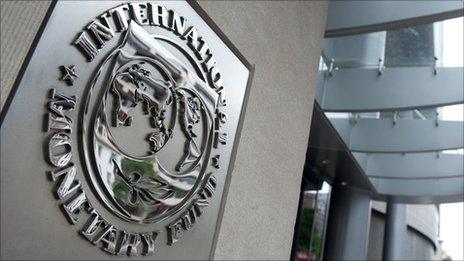Profile: Christine Lagarde, 'rock star' head of the IMF
- Published
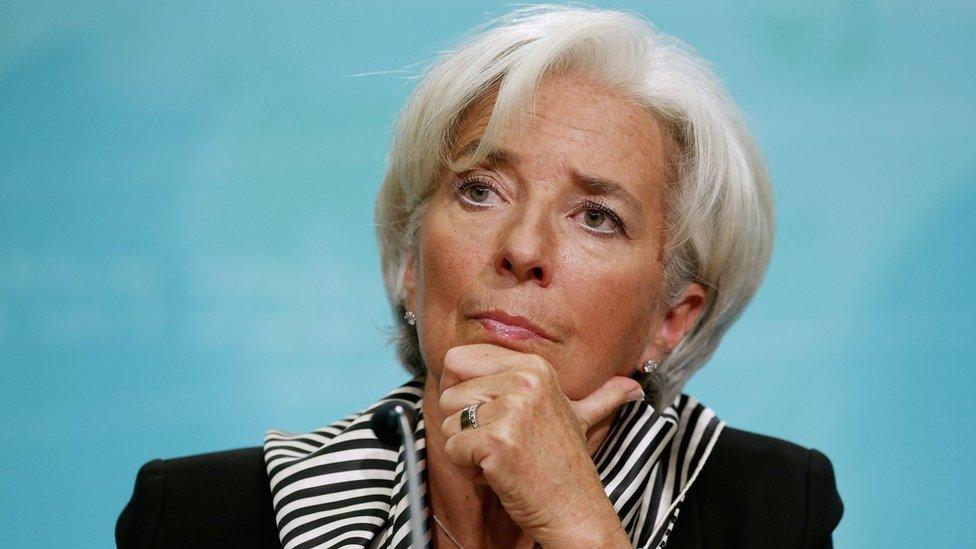
Christine Lagarde has been at the forefront of efforts to solve the global financial crisis
The case of Bernard Tapie has been hanging over Christine Lagarde almost since the day she took over as managing director of the International Monetary Fund (IMF) in 2011.
Just a month into the high-profile role, she found she was to be investigated for abuse of authority during her time as French finance minister in 2007.
She has now been convicted over the case.
The probe revolved around her decision to send for arbitration a long-running legal dispute between tycoon Bernard Tapie and a bank over the sale of a firm in which he had a large stake.
A multi-million-euro payment to Mr Tapie followed a year later, and led to allegations that the businessman had in effect been rewarded for supporting Nicolas Sarkozy, who won the 2007 presidential election.
Ms Lagarde has always defended her decision, saying it was "the best solution at the time", but in December 2016, she was convicted of negligence in the case. She will not serve a sentence.
Synchronised swimmer
Poised, chic and a fluent English speaker, Ms Lagarde, 60, is the first woman to head the IMF. But then, throughout her career, she has become familiar with the "first woman to..." tag.
Born Christine Lallouette in Paris, she tasted success even in her early days, representing the French synchronised swimming team as a teenager.
At 17, following the death of her father, Ms Lagarde went to study in the US for a year, where she perfected her English.
After graduating from law school in Paris, she obtained a Masters degree from the Political Science Institute in Aix en Provence.
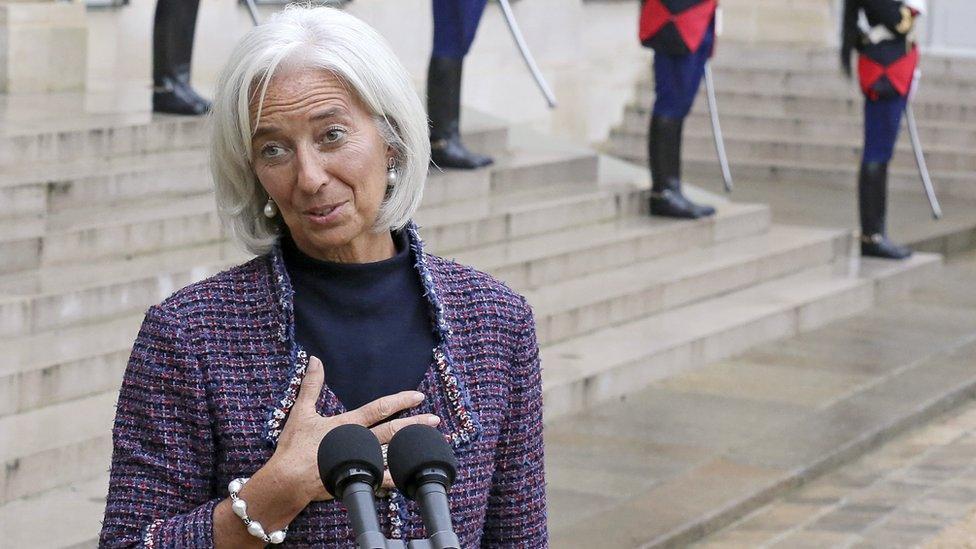
Christine Lagarde is known for being a straight talker
In 1981 she returned to the US, joining the international law firm Baker & McKenzie as an associate, specialising in labour, anti-trust, and mergers and acquisitions (M&A).
Eighteen years later, she became the first female chair of the firm.
Ms Lagarde was appointed France's trade minister in 2005 and, under her watch, French exports reached record levels.
In 2007 she became finance minister, the first woman to hold this post not just in France but in any of the G8 major industrial countries.
Never afraid to speak her mind, she blamed the 2008 worldwide financial crisis partly on the male-dominated, testosterone-fuelled culture at global banks.
One of France's most popular right-wing politicians, in 2009 she came second in a poll carried out by broadcaster RTL and newspaper Le Parisien on the country's favourite personalities, beaten only by singer and actor Johnny Hallyday.
But her popularity has stretched beyond French shores and she is viewed with high regard in the international arena.
Well before she took the helm of the IMF, the Financial Times voted her in 2009 the best finance minister in Europe.
She won international respect for promoting France's negotiating clout in key forums such as the G20.
She also received plaudits for the key role she played in approving a bail-out mechanism to aid struggling members of the eurozone in May 2010, and went on to be appointed to a second term at the top of the IMF from February 2016.
Her straight-talking manner has only added to her appeal.
Since taking over at the IMF, Ms Lagarde's main challenge has been to try to ease the eurozone debt crisis, in particular the huge bailout required for Greece.
'Rock star'
Ms Lagarde replaced Dominique Strauss-Kahn, another French politician, who resigned as head of the IMF following his arrest on charges of attempted rape in New York. She was a front runner from the beginning.
Kenneth Rogoff, a former IMF chief economist, spoke of her wide-ranging appeal: "She is enormously impressive, politically astute and a strong personality. At finance meetings all over the world, she is treated practically like a rock star."
But the divorced mother-of two faced some hurdles in her bid for the IMF job.
Her nationality was an issue for some. The job has traditionally fallen to French nationals, and some countries questioned the tradition of having a European in charge.
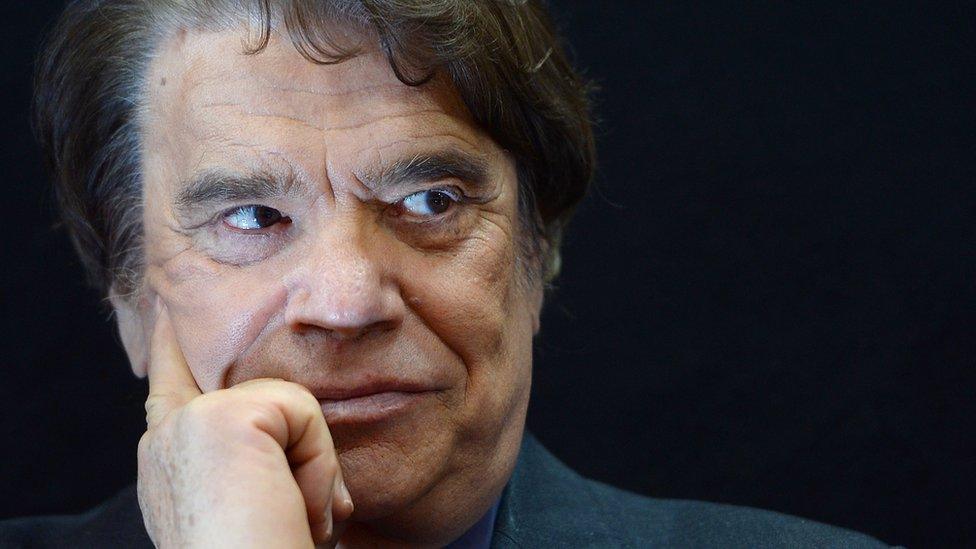
The fall-out of the legal case brought by Bernard Tapie has haunted Ms Lagarde for five years
Aside from geography, another stumbling block for Ms Lagarde's candidacy came in the form of the Bernard Tapie legal row.
Mr Tapie had been involved in a lengthy legal battle with the partly state-owned bank Credit Lyonnais, who he claimed had deliberately undervalued the sports good firm Adidas, which he sold in 1993.
In 2007, Ms Lagarde stepped in to end the court dispute by ordering a special panel of judges to arbitrate in the case. The following year, Mr Tapie was awarded €285m (£240m; $297m) in damages.
Ms Lagarde's decision not to challenge the ruling prompted a public outcry, amid accusations that a deal had been done as a way of thanking Mr Tapie for his support for Nicolas Sarkozy in the election.
Ms Lagarde denied any misconduct, and there is no suggestion of personal profit, but her Paris apartment was searched and she was questioned by police. French prosecutors opened a formal investigation of negligence into Ms Lagarde in 2014.
France's Court of Justice of the Republic on 17 December 2015 announced she should be tried on the charge of "negligence by a person in position of public authority".
After being found guilty a year and two days later, her lawyer said she would consider appealing.
- Published14 June 2011
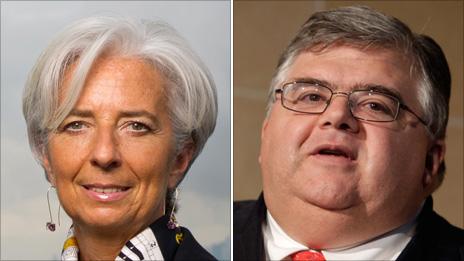
- Published14 June 2011
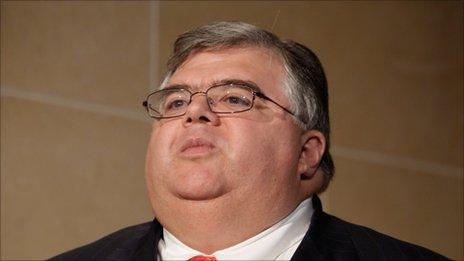
- Published10 June 2011
